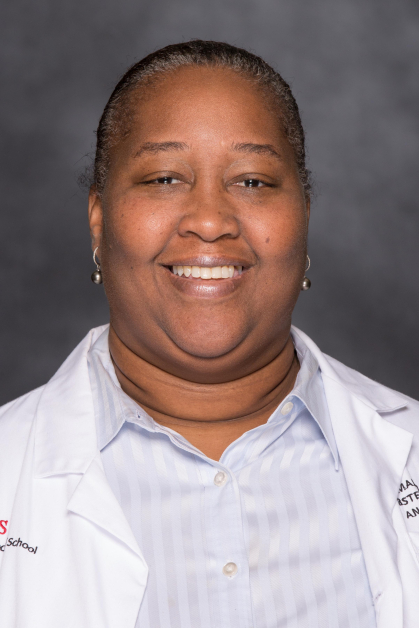A Rutgers Health expert addresses the urgent need for understanding barriers and providing culturally competent care

Each year, Black Maternal Health Week (April 11–17) brings attention to an ongoing crisis in the United States.
According to the Centers for Disease Control and Prevention, Black women are three times more likely to die from pregnancy-related complications than white women – a statistic that reveals racial disparities within the health care system.
To explore these challenges and the role that Rutgers New Jersey Medical School (NJMS) is taking to address this issue, Damali Campbell-Oparaji, an associate professor in the Department of Obstetrics, Gynecology and Reproductive Health Division, and a leading physician dedicated to improving maternal outcomes for women, highlights these inequities while providing crucial information to help expectant mothers advocate for themselves in an effort to receive better medical care.
Campbell-Oparaji discusses the barriers Black mothers face, the importance of culturally competent care and how Rutgers Health is working to drive change.
Why is Black maternal health such a critical issue in the U.S., and what factors contribute to the alarming disparities we see today?
Maternal health is one measure of a nation’s overall well-being. When left unaddressed, poor maternal health can create a ripple effect on families and reduce women’s productivity at home and work.
Black maternal health is a critical issue due to wide disparities seen between non-Hispanic white and non-Hispanic Black women in the U.S. – disparities that have existed for decades. Even college educated and increased socioeconomic status does not protect Black women from less favorable outcomes.
Factors contributing to these disparities include preeclampsia and a family history of preeclampsia, increased prevalence of high blood pressure and diabetes, social determinants, like access to care and economic barriers, environmental stressors, implicit bias, and a lack of culturally competent care.
What are some of the most common challenges Black women face during pregnancy, childbirth and postpartum care?
Black women face numerous challenges during pregnancy, childbirth and postpartum care, including institutionalized racism in health care, unaddressed social determinants of health and a lack of awareness of critical warning signs.
It’s important that pregnant women, their families and health care providers recognize post-birth warning signs, since symptoms might be early warnings of postpartum complications.
Black women face numerous challenges during pregnancy, childbirth and postpartum care, including institutionalized racism in health care, unaddressed social determinants of health and a lack of awareness of critical warning signs.
Damali Campbell-Oparaji
Associate Professor, Rutgers New Jersey Medical School
How is Rutgers New Jersey Medical School addressing Black maternal health, and what initiatives are currently in place to support Black mothers in the community?
NJMS addresses the maternal health crisis through research, patient care and community service – educating the next generation of doctors committed to health equity.
There’s a strong commitment to leveling the playing field for the greater Newark community and several NJMS departments, including obstetrics, gynecology and reproductive health, internal medicine, pediatrics and preventative medicine, have programs aimed at improving maternal health.
Key initiatives include a doula program providing prenatal, labor and postpartum support, a pregnancy clinic addressing gaps in prenatal care and the Healthy Moms Clinic, which offers ongoing care for mothers with medical conditions.
What advice would you give to Black mothers-to-be who want to advocate for themselves and ensure they receive quality care?
Write down your questions before your visit to ensure you don’t forget them. If your provider recommends something you don’t understand, ask for an explanation. Also, if possible, bring a family member or friend to appointments to have as an extra set of ears.
What are some actionable steps health care providers and medical institutions can take to close the gap in maternal health disparities?
Health care providers and institutions should examine their practices to ensure that policies and procedures don’t unintentionally disenfranchise certain patients.
Some colleagues say, “I treat everyone the same,” but that mindset is part of the problem. We need to meet patients where they are. Using technology where appropriate can also help address barriers like transportation issues and hospitals can also use evidence-based protocols, like patient safety bundles from the Alliance for Innovation on Maternal Health for hypertension and hemorrhage, to ensure treatments are administered without bias.
Additionally, social services should be used to facilitate care, not to stigmatize patients.
Discuss the significance of Black Maternal Health Week.
Held annually on April 11-17, Black Maternal Health Week is a campaign founded by the Black Mamas Matter Alliance to raise awareness, drive activism and community building and amplify the voices of Black mamas and birthing people.
The week is intentionally held during National Minority Health Month and begins on April 11 to align with the International Day for Maternal Health and Rights – advocating for the elimination of maternal mortality worldwide. The week is significant because it gives us an opportunity to examine our practices and see how we can change to meet the needs of all patients including Black women who are experiencing increased morbidity and mortality.



